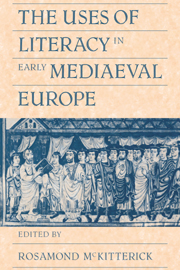Book contents
- Frontmatter
- Contents
- List of illustrations
- Contributors
- Preface
- Abbreviations
- Introduction
- 1 Literacy in Ireland: the evidence of the Patrick dossier in the Book of Armagh
- 2 Anglo-Saxon lay society and the written word
- 3 Administration, law and culture in Merovingian Gaul
- 4 Literacy and the papal government in late antiquity and the early middle ages
- 5 Literacy and the laity in early mediaeval Spain
- 6 Aspects of mediaeval Jewish literacy
- 7 Writing in early mediaeval Byzantium
- 8 Literacy displayed: the use of inscriptions at the monastery of San Vincenzo al Volturno in the early ninth century
- 9 Royal government and the written word in late Anglo-Saxon England
- 10 Literacy in Carolingian government
- 11 Text and image in the Carolingian world
- Conclusion
- Index
11 - Text and image in the Carolingian world
Published online by Cambridge University Press: 07 December 2009
- Frontmatter
- Contents
- List of illustrations
- Contributors
- Preface
- Abbreviations
- Introduction
- 1 Literacy in Ireland: the evidence of the Patrick dossier in the Book of Armagh
- 2 Anglo-Saxon lay society and the written word
- 3 Administration, law and culture in Merovingian Gaul
- 4 Literacy and the papal government in late antiquity and the early middle ages
- 5 Literacy and the laity in early mediaeval Spain
- 6 Aspects of mediaeval Jewish literacy
- 7 Writing in early mediaeval Byzantium
- 8 Literacy displayed: the use of inscriptions at the monastery of San Vincenzo al Volturno in the early ninth century
- 9 Royal government and the written word in late Anglo-Saxon England
- 10 Literacy in Carolingian government
- 11 Text and image in the Carolingian world
- Conclusion
- Index
Summary
The functions of writing and painting in early mediaeval western Europe must be set in the context of the uses, levels and distribution of literacy in the societies of the barbarian west, many of which have been discussed in the preceding papers in this volume. It is clear from Nelson's paper in particular that there is a growing consensus concerning the wider possession of, and resort to, literacy by the Franks at a number of different levels, especially as far as Carolingian government is concerned, and it is on the Franks in the eighth and ninth centuries that I concentrate in this paper. The Franks (and others under Carolingian rule) increased their resort to literate modes of legal, governmental and administrative transactions from the end of the eighth century. Carolingian civilization, indeed, was one largely dependent on the written word for its religion, its law, its government, its learning and its recording of the past. Its members, lay and cleric, attained widely divergent levels of both pragmatic and learned literacy that in a few telling cases we can document with some precision.
But it is not on this broader context I wish to dwell; I want rather to look at some of the manifestations and consequences of the uses of the written word, and to examine in particular the relationship between image and text in Carolingian book painting; this relationship is both a visible manifestation of the use of the written word and a consequence of literacy.
A starting point is to consider whether the Carolingians say anything about the relative value of writing and pictures.
- Type
- Chapter
- Information
- The Uses of Literacy in Early Mediaeval Europe , pp. 297 - 318Publisher: Cambridge University PressPrint publication year: 1990
- 5
- Cited by



